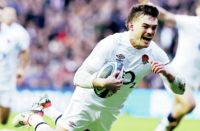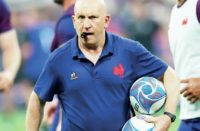 England will be favourites with the bookies for next week's match against the Wallabies, and it's not hard to see why. England have home advantage, they are ranked third in the world against Australia's fourth, and on the back of their 2013 Lions experience coaches Graham Rowntree and Andy Farrell – along with some of their players – have first-hand knowledge of what it takes to beat these Aussies.
England will be favourites with the bookies for next week's match against the Wallabies, and it's not hard to see why. England have home advantage, they are ranked third in the world against Australia's fourth, and on the back of their 2013 Lions experience coaches Graham Rowntree and Andy Farrell – along with some of their players – have first-hand knowledge of what it takes to beat these Aussies.
Since England lost narrowly to Australia last autumn they have played nine games, won seven, scored 19 tries and conceded 12. Over the same period Australia have played 12, won five, scored 21 tries and conceded 29. England's win percentage has been 78 per cent while the Wallabies has been only 42 per cent.
While all those stats favour a comfortable England home win, you have to take stock of who they have been playing. Australia has had by far the tougher opponents in the last 12 months, including New Zealand, South Africa and the Lions. England have had the usual Six Nations opposition and a very weak Pumas team away from home. Alongside that there was a very notable win against New Zealand last December, but a big loss against Wales in the Six Nations.
A comparison with this game last season shows just how much can change in 12 months of rugby these days. Of the likely starting line-ups on Saturday both teams will have 50 per cent or less of the players who started at Twickenham last year.
Psychologically, I think the advantage is with Stuart Lancaster's team. This is because not many England players playing have the scars of the loss last season, and there will also be inexperienced guys starting who's only aim will be to have a cracking game.
Against that the Australians have had their bodies and minds put through the blender, with a new head coach, a different game plan, a number of big losses and few wins.
It's been a tough season for the team from Down Under, but the end is near.
The natural way for teams to take on Australia – apart from New Zealand – is to go at them head on and physically dominate them up front, because the perception is they are weak in that department.
Australia have changed their game-plan under new coach Ewen McKenzie. He started off wanting to play a Queensland Reds style but soon realised it wasn't going to work with a lot of players from the Brumbies in his squad. McKenzie has gone back to a more pragmatic Brumbies approach based on territory achieved through kicking and a good chase, rather than running it out of your own half.
These two teams are heading in different directions style-wise. England's play has been tighter than a fish's what's it at 50,000 fathoms, and to progress England should be working flat out to produce quick ball and attack with real speed and accuracy.
With a refreshed Chris Ashton and probable newbie Marland Yarde you need to play a game that gets the best out of them.
Yarde's selection is a positive move because it means that it is unlikely that Lancaster is going to continue with the policy of picking Mike Brown out of position on the wing.
Brown is a full-back, and it now looks as if that is where he will be selected, and deservedly so because he has been the form No.15 for the last two seasons. That will leave Yarde to do what he does best for London Irish – which is score tries!
A back three of Brown, Yarde and Ashton tells me that England are going to counter-attack rather than kick, and part of that is because the two wings are runners rather than renowned tactical kickers.
It is also time that England created their own style and identity. I believe strongly that this is player-led rather than imposed by coaches. The great 2003 England side did not rely on coaches, they knew what they wanted to do. This 2013 team have to decide what is important to them.
In the Clive Woodward era it was about innovation and attention to detail – that was the 2003 template. What Lancaster's lot cannot do is just copy what New Zealand do. They are not NZ, and they need to find their own way to excellence, their own style.
To do that they have to find leaders, blokes who want to take responsibility. Billy Twelvetrees is one who needs to emerge as a backline leader who decides and calls the plays – and that means acquiring the confidence to do it and getting rid of some of the exaggerated respect for each other which sometimes stops standards being driven higher.
If Owen Farrell is the starting No.10 against Australia he can count himself lucky, because so far this season Toby Flood has been the more commanding of the two fly-halves. He adds more steerage, and has shown at Leicester that he can get the best out of what's there.
In other respects England are pretty much where they were last season in terms of selection, although Lee Dickson's promotion ahead of a sniper like Danny Care at scrum-half is surprising.
The test for this England side is that they have shown us they can reach the heights with last autumn's win over NZ.
From now on if they fail to match those standards it must be unacceptable to them as players.

























